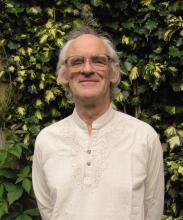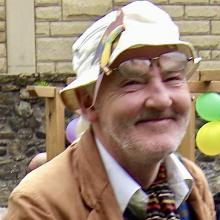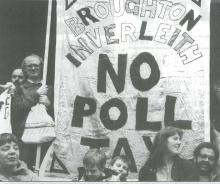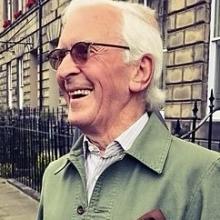
2 July 1930—12 June 2024
Eric Robinson was born in Hanley, Stoke on Trent, on 2 July 1930 to Carrie and Leslie Robinson. Music played a significant part in Eric’s life, right from the start. His father Leslie was a violinist who played in various amateur and semi-professional groups, as well as being an accomplished cinema musician accompanying the silent films around Stoke.
An intelligent and inquisitive boy, Eric attended Hanley Grammar between 1941 and 1949, and it was through school outings that he came to attend performances by touring companies, like the Carl Rosa opera company, or the actor Donald Wolfitt’s troupe, when they were performing at the nearby Theatre Royal. And later, Eric was taken by his father to performances at the Victoria Hall, where he heard the Halle under Barbirolli, singers like Kathleen Ferrier, and the Messiah for the first time. So, despite coming from what he described as ‘a mining village on the edge of an industrial town’, through his father Eric discovered a passion for music and the performing arts which was to stay with him for the whole of his life.
Eric [pictured here on his 90th birthday] often said that the gift his mother gave him was her unwavering devotion and love, and that in Carrie’s eyes he could do no wrong. His mother’s involvement and dedication gave Eric a sustaining sense of self which enabled him to live a fully-engaged and long life, right until the end. And the gathering of so many people at his funeral was a clear testament to Eric’s capacity to connect with people, and to sustain meaningful relationships, throughout his life.
After high school Eric undertook his compulsory military service in the Royal Air Force for an extended period of two years, before being discharged in December 1951. Following his discharge, Eric took advantage of an opportunity to teach English in France, which he did for two years. This was probably the beginning of his love affair with European culture, a passion which never left him and was a continual source of joy and inspiration.
After France, Eric began his undergraduate studies in the history of art at Edinburgh University, completing his postgraduate learning there as a mature student in 1962. It was during his MA that Eric was to meet a fellow student called Norman Young in an antiques shop, and thus began a loving partnership which endured until Norman’s untimely death in the late 1990s.
Immediately Eric completed his academic studies, he was offered a position as head of the Department of Art and Design History at Wolverhampton Polytechnic, and so he and Norman moved from Edinburgh to Wolverhampton where they remained until 1985. They joined and became active members of the Civic Society, what Eric referred to as being ‘worthy citizens’, before moving into the political sphere and joining the Liberal Party. In large part, this was because Eric believed the party was the only one which took a significant stance against racism.
Eric was the Liberal parliamentary candidate for Wolverhampton South West in 1970, standing against Enoch Powell, and then standing in Ludlow in the General Elections of 1974 and 1979. He was a district councillor for Bridgnorth and a county councillor for Shropshire between 1973 and 1986, and he was involved in formulating environmental and cultural policies for both the Liberal Party and for Shropshire County Council. At the same time, Norman was a district councillor and constituency secretary for the Liberal Party.
Eric returned to live in Edinburgh in 1986, choosing the city not just because of familiarity from his student days, but because it offered him so many possibilities in terms of cultural pursuits. He also had the chance of owning a spectacular Regency apartment in the New Town, which he spent the next 40 years furnishing with works of art which reflected his individual taste and aesthetic sensibility.
In Edinburgh, Eric continued to find a synthesis between his private passions and their political context. He became Director of SALVO, the Scottish Arts Lobby, a role he held until 1997 and which saw him speaking internationally at conferences in Denmark, Germany, Hungary, the Czech Republic, Luxembourg and France. He was Administrator of Community Arts Scotland between 1989 and 1998, and then became co-ordinator of Voluntary Arts Scotland. In 1992 Eric became a lecturer in Design History and Contemporary Studies at Dundee University, a post he only resigned in his 80s, so that he could travel more freely and enjoy opera and the fine-arts scene, around Europe.
Eric was a person who lived his professional and personal lives in a totally integrated way. He lived for aesthetic and artistic connections, which for him were always crucially contextualised by their time, place and political meaning. Eric championed artistic experience by his enthusiasm and by his patronage. He encouraged and made connections with artists, politicians, musicians, actors, activists, gallerists, individuals and communities. As two colleagues of Eric, who have known him since his time in the Midlands, wrote recently, ‘Aside from his political achievements – but underpinning them – was his personal kindness and his genuine interest in listening to and helping people.’
His loss is an enormous one, felt by us all.—Brett Morris
Readers who knew Eric Robinson are invited to add their own recollections to this page. Please email your words to spurtle@hotmail.co.uk.
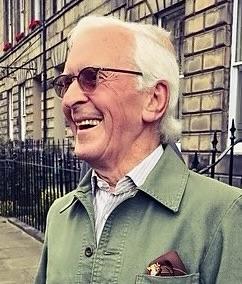
*****



